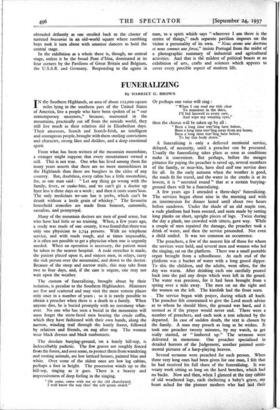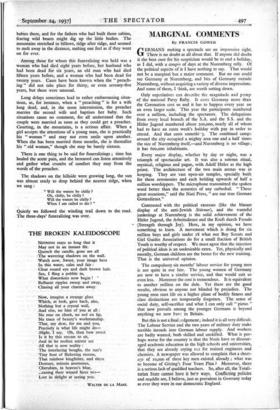FUNERALIZ1NG
By HARRIET G. BROWN
IN the Southern Highlands, an area of about iI2,000 square miles lying in the southern part of the United States of America, live a people who have been spoken of as " our contemporary ancestors," because, marooned in the mountains, practically cut off from the outside world, they still live much as their relatives did in Elizabethan days. Their ancestors, Scotch and Scotch-Irish, an intelligent and courageous people, brought with them sterling convictions and character, strong likes and dislikes, and a deep emotional spirit.
From what has been written of the mountain moonshine, a stranger might suppose that every mountaineer owned a still. This is not true. One who has lived among them for many years asserts that there are no more moonshiners in the Highlands than there are burglars in the cities of any country. But, doubtless, every cabin has a little moonshine, for, as one man said : " Let any thing go wrong with the family, fever, or snake-bite, and we can't git a doctor up hyer less'n three days or a week ; and then it costs scans'lous. The only medicines we-uns has is yerbs, which can't be drunk without a leetle grain of whiskey." The favourite household remedies are made from boneset, camomile, sassafras, and pennyroyal.
Many of the mountain doctors are men of good sense, but who have had little or no training. When, a few years ago, a study was made of one county, it was found that there was only one physician to 2,744 persons. With no telephone service, and with roads rough, and at times impassable, it is often not possible to get a physician when one is urgently needed. When an operation is necessary, the patient must be taken to the nearest hospital. A rude stretcher is made, the patient placed upon it, and sixteen men, in relays, carry the sick person over the mountains*, and down to the doctor. Because of the steep and narrow trails, this may take from two to four days, and, if the case is urgent, one may not wait upon the weather.
The custom of funeralizing, brought about by their isolation, is peculiar to the Southern Highlanders. Ministers are few and scattered and may visit the more remote places only once in a number of years ; so it is rarely possible to obtain a preacher when there is a death in a family. When anyone dies, he is buried promptly with no ceremony what- ever. No one who has seen a burial in the mountains will soon forget the stem-faced men bearing the crude coffin, which they have fashioned with their own hands, along the narrow, winding trail through the lonely forest, followed by relatives and friends, on nag after nag. The women wear black dresses and black sunbonnets.
The desolate burying-ground, 'on a lonely hill-top, is indescribably pathetic. The few graves are roughly fenced from the forest, and over some, to protect them from wandering and rooting animals, are low latticed houses, painted blue and white. Over some of the oldest ones are low log cabins, perhaps a foot in height. The procession winds up to the hill-top, singing as it goes. There is a beauty and impressiveness of deep feeling in the singing.
" Oh come, come with me to the old churchyard, I well know the way thro' the soft green sward."
Or perhaps one voice will sing :
" When I can read my title clear To mansions in the skies, I'll bid farewell to every care, And wipe my weeping eyes,"
then the chorus will be taken up by all :
" Been a long time trav'ling here below, Been a long time trav'ling away from my home, Been a long time trav'ling here below, To lay this body down.
A funeralizing is only a deferred memorial service, delayed, of necessity, until a preacher can be procured. Usually the funeralizing takes place as soon as conditions make it convenient. But perhaps, before the meagre pittance for paying the preacher is saved up, several members of the family, or near-kin, have died and one service does for all. In the early autumn when the weather is good, the roads fit for travel, and the water in the creeks is at its lowest, it is " norrated round " that at a certain burying- ground there will be a funeralizing.
A few years ago I attended a three-days' funeralizing. The services began about nine in the morning and with an intermission for dinner lasted until about two hours before sundown. Under the shade of an old maple tree, a rude platform had been erected, and seats made by resting long planks on short, upright pieces of logs. Twice during the day a plank, too crowded with sitters, gave way. While a couple of men repaired the damage, the preacher took a drink of water, and then the service proceeded. Not even a child smiled. It was too common an occurrence.
The preachers, a few of the nearest kin of those for whom the services were held, and several men and women who led the singing, sat on the platform. There was a small portable organ brought from a schoolhouse. At each end of the platform was a bucket of water with a long gourd dipper. To this the children, and the adults, went often, for the day was warm. After drinking each one carefully poured back into the pail any drops which were left in the gourd. The water was precious, for it had been brought from a spring over a mile away. The men sat on the right and the women on the left. The kinsfolk had the front seats.
The service began with prayer, during which all knelt. The preacher felt constrained to give the Lord much advice as to whom he should bless, the ground was hard, and it seemed as if the prayer would never end. There were a number of preachers, and each took a text selected by the departed. In case of sudden death, the text is chosen by the family. A man may preach as long as he wishes. It took one preacher twenty minutes, by my watch, to get really started, or " limbered up." The sermons were delivered in monotone. One preacher specialised in detailed horrors of the Judgement, another painted senti- mental pictures of a harp-playing heaven.
Several sermons were preached for each person. When three very long ones had been given for one man, I felt that he had received his full share of the funeralizing. It was weary work sitting so long on the hard benches, which had no backs. Now and then, when I glanced at the tiny cabins of old weathered logs, each sheltering a baby's grave, my heart ached for the pioneer mothers who had laid their babies there, and for the fathers who had built those cabins, fearing wild beasts might dig up the little bodies. The mountains stretched in billows, ridge after ridge, and seemed to melt away in the distance, making one feel as if they went on for ever.
Among those for whom this funeralizing was held was a woman who had died eight years before, her husband who had been dead for six years, an old man who had died fifteen years before, and a woman who had been dead for twenty years. Cases have been known when the " preach- ing " did not take place for thirty, or even seventy-five years, but these were unusual.
Long delays sometimes lead to rather embarrassing situa- tions, as, for instance, when a " preaching " is for a wife long dead, and, in the noon intermission, the preacher marries the second wife and baptises her baby. Such situations cause no comment, for all understand that the couple were married as soon as they could get a preacher. Courting, in the mountains, is a serious affair. When a girl accepts the attentions of a young man, she is practically his " woman " and may not even smile upon another. When she has been married three months, she is thereafter his " old woman," though she may be barely sixteen.
There is one thing to be said for funeralizimgs ; time has healed the acute pain, and the bereaved can listen attentively and gather what crumbs of comfort they may from the words of the preacher.
The shadows on the hillside were growing long, the sun was almost ready to drop behind the nearest ridge, when we sang :
" Will the waters be chilly ? Oh, chilly, be chilly ?
Will the waters be chilly ? When I am called to die ? "
Quietly we followed the winding trail down to the road. The three-days' funeralizing was over.



















































 Previous page
Previous page